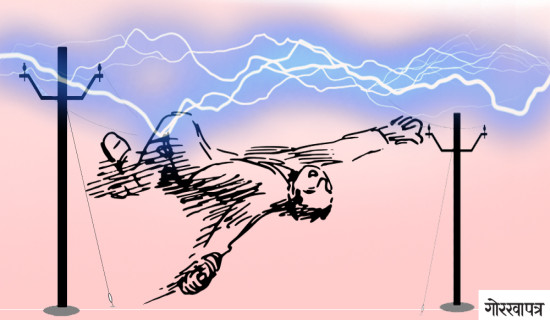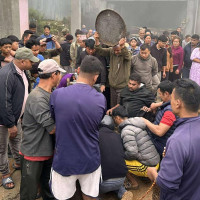- Thursday, 17 July 2025
Skilled wood carvers in short supply in Khotang
BY RAJ KUMAR BHATTARAI,Khotang, Aug. 2: A few years ago, carpenters who used to carve various wooden pots commonly used in almost all households were easily available.
But, at present, though there is still a demand for wooden objects, finding skilled carpenters has become challenging.
In the past, carpenters were easily available in Khotang district. But at present there are only two carpenters in Jalapa of Ward No. 12 in Diktel Rupakot Majhuwagadhi Municipality who can crave wooden pots, which are required to store ghee and make and whisk yoghurt. They are Chandra Bahadur Bishwokarma and Om Raj Bishwokarma, uncle and nephew, by relation.
Chandra and Om can be found carving wooden pots at Lumjhu Khola, except in the rainy season.
They collect wood of Daar species from Sapteshwor of the neighbouring rural municipality, Kepilasgadhi Rural Municipality-5. After collecting the wood, they make wooden objects sitting on the river banks.
Chandra said that he makes various items from wood such as theki, kathuwa, tongba and curd container, karuwa, harpe, batuka, ashtray and others.
He said that there was no problem in selling those objects since they get pre-orders and sell the items directly from the carpentry spot. The remaining items are sold from the markets in the district headquarters, Diktel.
He added that most of the orders come from Dharan, Kathmandu and other cities. Some of the products have even reached the United Kingdom.
Om, who spent a few years working in Malaysia, decided to return to Nepal and continue with the family business as he did not find much success abroad. He expressed, "It has been four years since I returned to Nepal. I regret going abroad.
I had to work hard there. But, working hard in my own country, I can easily earn Rs. 30,000 to Rs. 40,000 per month."
According to Om, there is a high demand for wooden objects but a shortage of skilled people.
Wooden items like theki are in high demand since locals use it in their day-to-day life.
Similarly, Kathuwa is a must-have item for the Rai community during weddings, weaning ceremonies and other major festivals.
Meanwhile, the demand has also risen as some governmental and non-governmental organisations use such wooden objects as souvenirs.
















